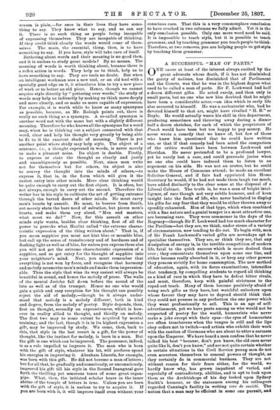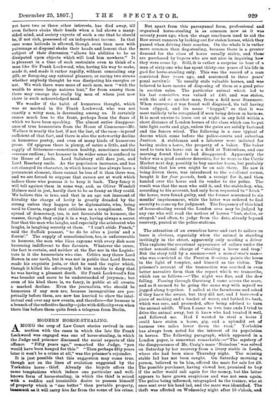A SUCCESSFUL "MAN OF PARTS."
ONE cause at least of the interest always excited by the great advocate whose death, if it has not diminished the gaiety of nations, has diminished that of Parliament and the Courts, was that he was in the highest degree what used to be called a man of parts. Sir F. Lockwood bad half a dozen different gifts. He acted rarely, and then only in small parts, but no one who saw him doubted that he might have been a considerable actor,—an idea which in early life also occurred to himself. He was a caricaturist who, had he devoted himself to that art, might have rivalled " H. B." or Doyle. He would actually waste his skill in this department, producing sometimes and throwing away during a dinner half a dozen sketches, for each of which the proprietors of Punch would have been but too happy to pay money. He never wrote a comedy that we know of, but few of those who knew him questioned that he could have written one, or that if that comedy bad been acted the comparison of the critics would have been between Lockwood and Sheridan. He never pretended to be a profound lawyer, yet he rarely lost a case, and could persuade juries when no one else could have induced them to listen to an argument on his side. He was not an orator, but he could make the House of Commons attend; he made an excellent Solicitor•General, and if fate had appointed him Home Secretary he would, if he had not made them laugh too much, have added distinctly to the clear sense at the disposal of a Liberal Cabinet. The truth is, he was a man of bright intel- ligence, of rare though not very subtle humour, and of keen insight into the facts of life, who never hesitated to display his gifts for any fear that they would be either thrown away or speedily exhausted. Men of that type, which when combined with a fine nature and a genial temper is a most attractive one, are becoming rare. They were commoner in the days of the Regency—though Sir F. Lockwood had too much character for the Pavilion—but they are, we think, under stress of a variety of circumstances, now tending to die out. To begin with, men of Sir Frank Lockwood's varied gifts are nowadays apt to specialise themselves. They see, or think they see, that any dissipation of energy is, in the terrible competition of modern life, fatal to the quick success which is more desired than ever ; they concentrate themselves upon some one line, and either become really absorbed in it, or keep any other powers they possess strictly for home consumption. The new method of education, again, with its fierce examinations, intensifies that tendency, by compelling students to regard all thinking as a kind of race in which they have to defeat bitter rivals, and must, therefore, keep with painful strictness to the roped-out track. Many of them become positively afraid of using such gifts as they have, lest watchful onlookers upon whose favour they may have to depend should think that they could not possess in any perfection the one power which they want professionally to sell. This is an age of self- advertisement, yet we have poets among ns who would not be suspected of poetry for the world, humouriets who never make a joke except with their eyes—the eyes of humourists are often treacherous when the tongue is still and the lips obey orders not to twitch—and artists who exhibit their work with the caution of Germans who are about to utter a sarcasm upon the Emperor. We have heard a man confess that he never talked his beet " because, don't you know, the old ones never quite like it, don't you know," and are not quite certain whether in certain situations in the Civil Service young men do not even accustom themselves to conceal powers of thought, as they certainly do in commercial business. They are not without reason for their fears either, for the world, we hardly know why, has grown impatient of varied, and especially of contradictory, abilities, and is apt to look upon them as the Archbishops of his day looked upon Sydney Smith's humour, or the statesmen among his colleagues regarded Canning's facility in writing vets de sociae. The notion that a man may be efficient in some one pursuit, and
yet have two or three other interests, has died away, till even fathers shake their heads when a lad shows a many- sided mind, and society expects of such a one that he should be, if not rich, possessed of an independent income. In that case some latitude is allowed, though even then men with patronage at disposal shake their heads and lament that the subject of their discussion "allows his abilities to be so dissipated upon objects which will lead him nowhere." It is pleasant in a time of such restraints even to think of a man like Sir Frank Lockwood, who, having his way to make, made it, and made it rather rapidly, without concealing any gift, or foregoing any rational pleasure, or caring two straws whether anybody thought he was dissipating his energies or not. We wish there were more of such men, men "with the wealth to some large natures lent," for from among them there may emerge the really big men of whom just now there is such acknowledged need.
We wonder if the habit of humorous thought, which was so marked in Sir Frank Lockwood, who was not exactly a witty man, is decreasing among us. It certainly comes much less to the front, perhaps from the fears of which we have been speaking. The almost entire disappear- ance of true humourists from the House of Commons—Mr. Wallace is nearly the last, if not the last, of the race—is proof sufficient of that fact, and there is also the noteworthy decline an humorous poetry, and even of many kinds of humorous prose. Of epigram there is plenty, of satire a little, and the supply of bitterness—sometimes healthy, sometimes morbid —seems endless ; but humour in its wider sense is confined to the House of Lords. Lord Salisbury still dare jest, and Lord Rosebery smile. As the population increases, and has not changed its character, in which humour has always been a permanent element, there cannot be less of it than there was, and we are forced to suppose that causes are at work which induce those who possess it to keep it back. They fancy it will tell against them in some way, and, as Oliver Wendell Holmes said in jest, hardly dare to be as funny as they could. We believe this is true, and that in an age not innocent of frivolity the charge of levity is greatly dreaded by the strong unless they happen to be diplomatists, who, being used to Courts, regard that criticism as a compliment. The spread of democracy, too, is not favourable to humour, the masses, though they enjoy it in a way, having always a secret fear that the man who laughs, and especially the aristocrat who laughs, is laughing secretly at them. "I can't abide Punch," said the Suffolk peasant, " he do be alias a jeerin' and a fleerin'." The supply of sensationalism, too, is unfavourable to humour, the man who likes cayenne with every dish soon becoming indifferent to fine flavours. Whatever the cause, the fact is certain, and neither at the Bar nor in the Legisla- ture is it the humourists who rise. Critics may throw Lord Bowen in our teeth, but it was not in public that Lord Bowen made his exquisite jests, or that he used the rapier which, though it killed his adversary, left him unable to deny that he was having a pleasant death. Sir Frank Lockwood's fun was broader and more to be understanded of jurymen ; but even of his kind there is, we fancy, in public at all events, a marked decline. Even the journalists, who should be humorous if any men are, because incongruities are per- petually before them, are now too hurried to chew the intel- lectual cud over any new events, and therefore—for humour is a branch of the reflective faculty—joke with difficultyeven when there lies before them quite fresh a telegram from Berlin,



































 Previous page
Previous page